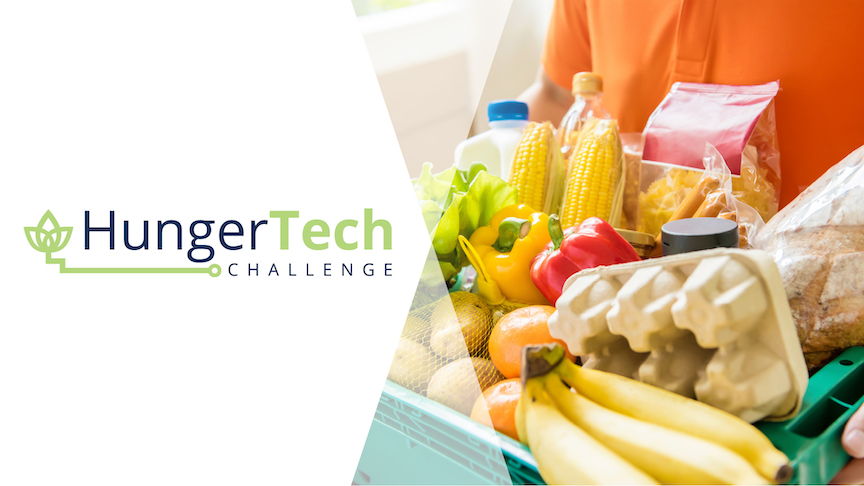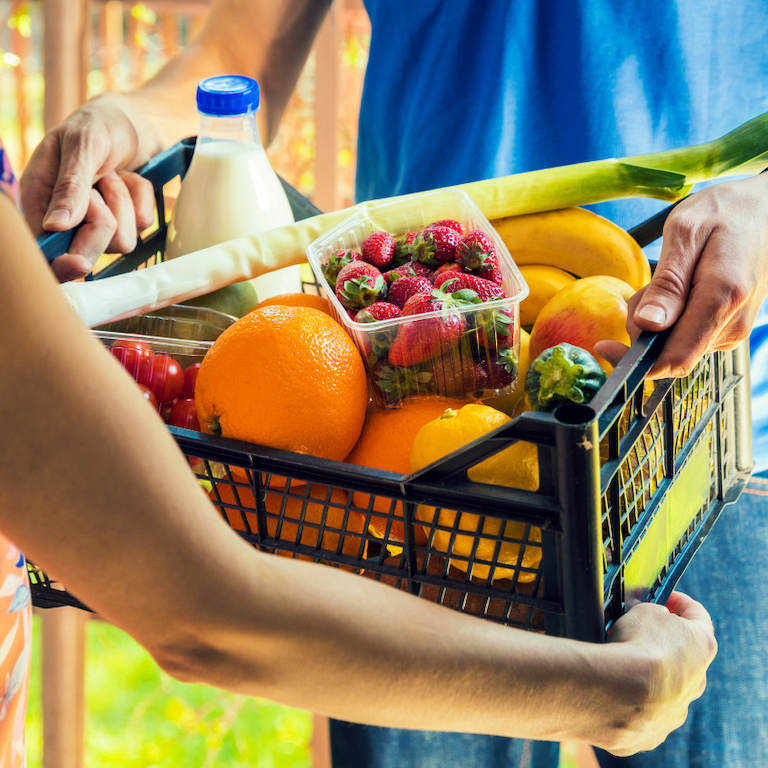From leading employers to nightlife hotspots, Life in Indy is your comprehensive guide to the Indianapolis region. This site gives you a full virtual tour experience, so you can explore our community and decide where in Indy is the best place for your new home.
AgriNovus launches HungerTech Challenge to combat food insecurity.

Photo courtesy of AgriNovus
Across the globe, billions of people struggle with food insecurity each year, and the United States is no exception. Approximately 11% of the U.S. population lacks consistent access to enough healthy food to live a happy, healthy life.
Resources like food banks, soup kitchens, and the Supplemental Nutrition Assistance Program (SNAP) help feed those in financial need. But poverty is only one of the factors that leads to food insecurity. Available housing, structural racism, medical issues, and geographic isolation all have a part to play in this complex, socio-economic crisis.
For example, what happens if you can’t access those support resources? How can you eat nutritious meals if you can’t invest in perishable foods? And how do you feed your family when the only nearby store is a 7-Eleven?
AgriNovus Indiana is a non-profit committed to inspiring agriculture innovation and finding solutions to questions like these. As part of the Central Indiana Corporate Partnership (CICP), AgriNovus helps advance and support our state’s agbiosciences industry, including our food ecosystem.
In their recent research, AgriNovus partnered with Purdue University and EY-Parthenon to study Indiana’s food supply chain, and the results were staggering.
Their study found that food insecurity impacts approximately 13% of Indiana residents, meaning that more than 800,000 Hoosiers regularly struggle with hunger. Moreover, 22% of Indiana residents currently live in food deserts with low access to healthy nutrition.
In light of those statistics, AgriNovus recognized a need for new solutions that directly address common barriers to hunger relief. Their answer? The HungerTech Challenge.
What is the HungerTech Challenge?
HungerTech is a four-week innovation challenge, where tech pioneers compete to improve the lives of SNAP recipients. In partnership with Elevance Health, AgriNovus invited students, entrepreneurs, and established companies alike to pitch their ideas to combat food insecurity.
Each team was challenged to build a scalable, viable business using technology to increase nutrition access for our food-insecure neighbors. The winner would then receive a $25,000 grand prize, as well as help piloting their solution with the State of Indiana in Fall 2022.
“Hunger as a whole is such a complex issue. You can’t just create one thing and have it solve the problem,” said Geoff Zentz, Senior Director of Innovation at AgriNovus Indiana. “But our hope at AgriNovus is that if we continue to drive toward innovation in these spaces, we have an opportunity to make a big impact—not only in Indiana, but hopefully the entire country.”
While many non-profits fight against hunger, the HungerTech Challenge is unique in its focus on tech innovation. In the past, food insecurity has been defined by proximity, but modern technology is changing the way people communicate, shop, and even eat.
In fact, the majority of SNAP recipients now own smartphones, which are an essential purchase even for low-income families. With reliable Internet access, food-insecure households can overcome the proximity problem by ordering online and delivering groceries right to their door.
“When you think about food deserts and access to healthy foods, there are often multiple barriers in place,” said Geng Wang, HungerTech Participant and Founder of Civic Champs. “Technology can shortcut that. Suddenly, if you have a mobile phone, you can now access virtually any store in your geography.”
The only problem is paying for delivery. Food assistance programs like SNAP can help pay for groceries, but those funds can’t be used on shipping or delivery fees. This became a problem during the pandemic, when many families were dependent on deliveries they couldn’t afford.
That’s where HungerTech comes in. AgriNovus encouraged teams to create new technologies that could help SNAP recipients receive fresh groceries—regardless of location. These new solutions would initially start in the Indiana market. But after a successful pilot, they could replicate that success all across the country.
“Indiana is just a stepping stone. [Hunger] is not just an Indiana problem to solve. But if you use Indiana as a microcosm, then you can apply it to other parts of the Midwest, other parts of the country, and other parts of the world.”
HungerTech challenged teams to think outside the box.
On June 1, 2022, the clock started ticking. Each team only had four weeks to design, develop, and deliver a proof of concept for their solution. Fortunately, AgriNovus was there to support them throughout the process.
Part of the HungerTech Challenge was a targeted accelerator program to help teams ideate and iterate their product. Throughout the month of June, AgriNovus provided teams with research data, while connecting them with resources and partners in the industry. Participants also received one-on-one coaching to guide their product development.
“We went from ideation all the way through creation—how it was going to work, how it was going to make money, all of those things,” Zentz said. “In those four quick weeks, we connected them with experts, mentors, and other folks that could support them as they worked towards their business idea.”
A total of 18 teams participated in the HungerTech Challenge, and each one tackled a different aspect of food insecurity. Some teams developed innovative ways to deliver groceries, while others focused on bringing fresh produce to food deserts.
Boiler-Up Farm came up with a clever idea to install gardens in parking garages. BlueSky Commerce partnered with KLaunch on a comprehensive messaging platform for the whole food ecosystem, offering everything from shopping tips to affordable recipes. And Civic Champs designed an app where people could volunteer to deliver groceries.
All of these ideas had the potential to revolutionize the fight against hunger, but time was short. Teams had to move quickly if they wanted to make their vision a reality before pitch day.
“We really pushed towards: how quickly can we get [this product] to market?” Zentz said. “Innovators often want to start with the perfect version, but that’s actually counterintuitive. You need to get the ugly duct-tape-and-bubble-gum version to market quickly, so you can learn and keep building toward the ultimate vision.”
After four weeks of intensive work, only 11 teams made it to the end of the challenge with a viable proof of concept. Each team presented their solution before a panel of judges, and the final deliberation took well over an hour. But in the end, Civic Champs won the challenge and took home the $25,000 prize.
Civic Champs connects food-insecure Hoosiers with volunteer delivery drivers.
Civic Champs is a relatively young startup based in Bloomington, Indiana. They launched back in 2019, aiming to become “the most intuitive and impactful” volunteer management platform for non-profits.
That mission became difficult in 2020, but despite the lockdown, Civic Champs realized that people still wanted to go out and help their community. They quickly pivoted and launched a new initiative called Helping Hands to connect volunteers with neighbors in need.
From pharmacy pick-ups to grocery shopping, these small acts of kindness helped support high-risk Hoosiers during the height of the pandemic.
“When HungerTech came out, we thought it was the natural evolution of a lot of the work we’d already done,” Wang said. “We were already sort of experts in the space. We knew how to do deliveries, and we knew how to manage volunteers. [Our HungerTech solution] was different—but not too different.”
For the HungerTech Challenge, Civic Champs used their experience with Helping Hands to create a new mobile app for food-insecure families. This app empowers SNAP shoppers to purchase their groceries online and then schedule a volunteer delivery—free of charge.
Because of the pandemic, most grocery stores now have complimentary pick-up services for online orders. Civic Champs simply created a platform that connects those orders with volunteers willing to deliver them.
At the start of the challenge, Civic Champs was determined to deliver at least one grocery order by the end of the month—and they succeeded. In just four weeks, they transformed their innovative idea into meaningful impact.
“It’s been really inspiring to see how much people care about [food insecurity]. It’s always a learning experience to see what ails our community, but it’s great to feel like you’re taking action to make a difference,” Wang said. “Even if we’re just delivering five meals a week, that’s five more families that have access to healthy food.”
AgriNovus continues to lead the nation in the fight against hunger.
With the winner crowned, the HungerTech Challenge has officially come to a close. But at AgriNovus, the work has only just begun.
Throughout Fall 2022, AgriNovus and the State of Indiana will continue to collaborate with Civic Champs as they launch their mobile app. During this pilot phase, Civic Champs plans to expand the app with new features, including delivery tracking, order management, and messaging capabilities.
However, Civic Champs isn’t the only HungerTech participant that’s hard at work. More than half the teams are moving forward with their own ideas to solve food insecurity.
“Honestly, it wasn’t about winning and losing to us. It was about getting closer to solving this problem,” said Kevin Lyons, Chief Strategy Officer at BlueSky Commerce. “That’s the culmination. We’re getting people to pay attention. And with all the data we’re able to provide, that will make this whole hair-on-fire experience worth it.”
As the HungerTech teams continue to innovate, their data will help inform future policymaking for federal hunger relief programs. AgriNovus plans to report findings from the HungerTech Challenge to Congress later this year, in anticipation of the 2023 Farm Bill.
“The Farm Bill is actually what funds SNAP benefits, and they only look at it every five years,” Zentz said. “We want to be responsible with those dollars. We want to find a way to create meaningful change for SNAP participants without asking for additional funding.”
The result may be as simple as an acknowledgement in the Farm Bill, saying that third-parties are allowed to deliver SNAP groceries. But that acknowledgement helps pave the way for businesses interested in helping our food-insecure neighbors.
In the meantime, AgriNovus is already planning future challenges like HungerTech to accelerate innovation in the agbiosciences.
“There are millions of problems in the world, but we try to focus on the issues we’re uniquely positioned to solve,” Zentz said. “HungerTech was the intersection of all the things Indiana is good at. We’re producers and farmers, but we’re also a hotbed of tech startups. And when you put those pieces together, we can make change happen.”
Learn more about AgriNovus Indiana and the Central Indiana Corporate Partnership.




